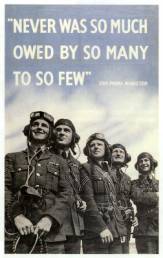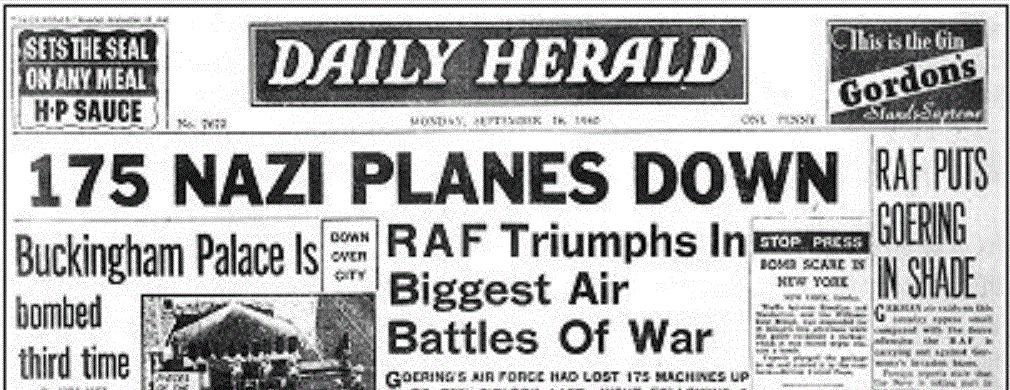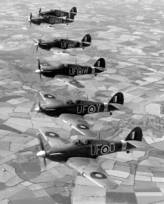|
|
|
|
Winston Churchill, speaking in the House of Common (11 June 1940).
|
Going DeeperYouTube Battle of Britain, 15 Sept 1940 - clip from the 1969 movie
|
|
Hitler wanted to invade Britain. He called his plan ‘Operation Sealion’. He had detailed plans of who would rule Britain after it was conquered. His propaganda machine had already made a newsreel of the ‘victorious’ German soldiers and the British they had ‘captured’. But Britain was defended by the Royal Navy, which was much stronger than the German Navy. If Hitler was going to mount an invasion of Britain, he would have to find a way to defend his invasion barges from attack. The German airforce – the Luftwaffe – could defend the invasion, but, to do that, Hitler would first have to knock out the Royal Air Force (RAF). That is how the Battle of Britain came about. The Battle of Britain was really the first part of Hitler’s invasion of Britain. Four developments laid the foundations of Britain’s survival: 1. Firstly, Britain had built a series of radar stations (July 1935). British radar was superior because, not only could it tell where the enemy planes were coming from, but it had a way to telling the fighters so that they could go and attack them. 2. Secondly, in July 1937, Air Chief Marshall Dowding was appointed Commander-in-Chief of Fighter Command. He was a brilliant commander who – on a small budget – was able to reorganise the RAF into four Groups, each divided into a number of sectors (each with a main sector airfield with a number of supporting airfields). 3. Thirdly, the British developed two brilliant planes – the Hurricane (Nov 1935) which was reliable and was used to shoot down the Luftwaffe bombers; and the Spitfire (March 1936), the fastest plane in the world, which was used to destroy the Nazi fighters which protected the bombers. 4. Fourthly, in May 1940, Churchill put Lord Beaverbrook (owner of the Daily Express) in charge of aircraft production. He ran one appeal for aluminium – ‘We will turn your pots and pans into Spitfires and Hurricanes’ – and another scheme where towns, groups or individuals could ‘buy’ a Spitfire (for £5000) and send it off the fight the Nazis. He also set up a Civilian Repair Organisation, which made new planes from the left-over pieces of planes which had been shot down. Beaverbrook cut through government red tape, and increased the production by 250%; in 1940, British factories produced 4,283 fighters, compared to Germany’s 3,000.
|
Source A
Poster published by the government during the war.
Did You KnowDowding, a Scot was a dull, boring character nicknamed ‘Stuffy’.
|
The Battle of BritainThe Battle of Britain started officially on 10 June 1940, when the Luftwaffe attacked a convoy of ships off Dover. But the real air war started on 12 August (when the Luftwaffe attacked the RAF), and lasted until 31 October. At first the Luftwaffe attacked radar stations and airfields. Although the Luftwaffe lost more planes than the RAF, by the 31 August the RAF was at its last gasp – in the previous fortnight the RAF had lost 295 planes destroyed and 170 damaged, 103 pilots killed and 128 wounded. Flying five or more ‘sorties’ a day, the young British fighter pilots (nicknamed ‘Dowding’s chicks’) were becoming exhausted; more importantly, the RAF was not training new pilots as fast the pilots were being killed. The weekend 30-31 August was the worst weekend of the battle for the RAF, with 65 fighters destroyed and 6 of the seven sector stations in the vital south-east Group out of action. Just as Fighter Command was about to collapse, however, a miracle happened. On 24 August, by accident, some Luftwaffe bombers had dropped their bombs on London. The next few nights, the RAF replied by bombing Berlin. Hitler was angry. On 2 September he ordered his bombers to attack London. On 7 September the Nazi bombing raid was so huge that a false alarm went round the south-east of England: code-word ‘Cromwell’ – invasion imminent. Church bells rang and the Home Guard mobilised. It was not known at the time but one section of coast identified by the Nazis as a landing ground was defended by a Home Guard platoon with just one machine-gun! Hitler’s decision to stop attacking the RAF gave it time to recover. On 15 September, the Luftwaffe came by day in huge numbers. It expected to sweep the RAF from the skies. But the RAF fought them off. At one point every British plane was in the sky – soon, some would have to come in to refuel and there were no reserves to protect them. But the Luftwaffe, too, was at the limit and – just in time – it turned back.
15 September is celebrated as ‘Battle of Britain day’. Source B
Headline from 16 Sept. In fact, only about 69 enemy planes were destroyed. Does this mean that this newspaper is a useless source to historians?
In the meantime, the RAF had been bombing the Nazi invasion fleet. On 17 September, Hitler ordered the postponement of Operation Sealion. Instead, the Luftwaffe concentrated on night-bombing London (the ‘blitz’). In all, the RAF lost 1,173 planes and 510 pilots and gunners killed in the Battle of Britain. The Luftwaffe lost 1,733 planes and 3,368 airmen killed or captured. If the Luftwaffe had succeeded, Britain would have been invaded and conquered. But the RAF held out, and Britain survived.
|
Did You KnowThe Spitfire was designed by Reginald Mitchell, who was dying of cancer. He worked round the clock on the plane, and finished it just before his death.
Hurricanes of 601 squadron
Did You KnowI have been contacted by a student on the History Help forum who told me that: "The British pilots were joined by many pilots from Poland, the Czech republic, Canada or New Zealand. 12% of all German planes destroyed in the Battle of Britain were destroyed by Polish pilots. Also, foreign pilots helped modify the way that British pilots were flying; the British were flying in tight formations which meant that they were spending more time on looking at themselves - in order not to collide - rather than searching the sky for enemies."
|
Source C
Winston Churchill, in the House of Commons, 20 August 1940
|
Consider:1. Study Source A. Find the four qualities of British airmen which - according to Churchill - helped them to win the Battle of Britain. 2. Churchill (Source A) praised the pilots for winning the Battle of Britain. Do you agree? Can you find SIX other reasons why Hitler failed to invade Britain?
|
|
|
|
|
Spotted an error on this page? Broken link? Anything missing? Let me know. |
|


